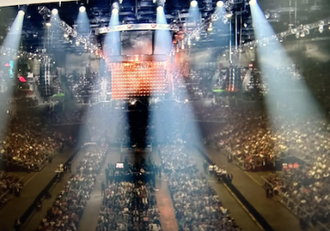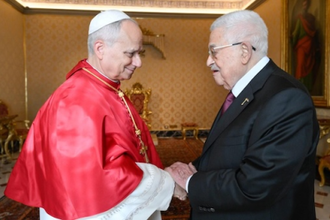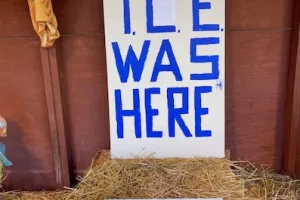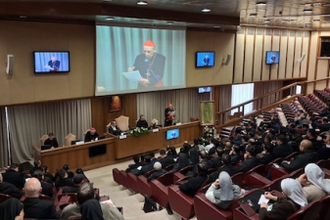Pope in Hungary - Day Two

Youth rally in Papp László Budapest Sports Arena
Source: Vatican News
Pope Francis had a packed schedule on the second day of his Apostolic Journey to Hungary. Besides meetings with church leaders he attended several major public events - a school for blind children, a gathering of refugees and a large youth rally.
The day began with a visit to the Blessed László Batthyány-Strattmann Catholic Social Institution, Kindergarten, Primary School, and Special Children's Home for the Blind. The Holy Father was welcomed to the Institute by its director, György Inotay, who greeted the Pope with the Franciscan prayer for peace, which he read in Latin. After a short tour of the facilities, Pope Francis attended a concert with works primarily by Hungarian composers. Following the concert, the Pope met with some of the children cared for in the home.
Pope thanked the centre's director for starting the event with the prayer associated with St Francis, calling it "a program of life."
He said the saints always seek to embrace the reality of life around them and do something to improve the lives of others, without seeking to escape from reality.
"As we walk in our reality as it is, we need to strive ahead exactly in this reality, and this is the Gospel, pure and simple," said the Pope. "Jesus came to assume reality as it was and carry it forward."
He added that it would have been easier for Jesus to latch on to a simple ideology and proclaim it "without properly taking reality into account." However, said the Pope, Jesus chose the path of reality, adding that this should be the goal of all Christians.
Pope Francis concluded his brief remarks by thanking the children for offering him a warm welcome to their home.
Later, at St Elizabeth's Church in Budapest, around 600 refugees and poor people to listen to Pope Francis. Some one thousand more filled Rózsák Square outside.
Some offered their testimonies of life marked by persecution, fear and flight. The Pope said he was moved by the stories, and he reflected on the testimony brought by Oleg and his family who fled the horrors of war in Ukraine.
"Their journey to the future," brought them to Hungary, he said, and "began with a journey of memory because Oleg remembered the warm welcome he received in Hungary years ago when he came to work here as a cook."
Noting that the memory of that experience encouraged Oleg to take his family and come here to Budapest, where he met with generous hospitality, the Pope said: "The memory of love received rekindles hope and inspires people to embark upon a new journey in life."
"Even amid pain and suffering, once we have received the balm of love, we find the courage needed to keep moving forward: we find the strength to believe that all is not lost, and that a different future is possible."
Many of the refugees gathered at St Elizabeth's Church were from Ukraine, but there were also refugees from Pakistan, Afghanistan, Iraq, Iran, Nigeria, South Sudan and other countries.
Since Russia invaded its neighbour more than a year ago, more than two million Ukrainians have crossed into Hungary. Some 35,000 have applied for the EU's temporary protection status in the country.
Pope Francis' discourse was pastoral in tone and references, as he reminded those present to never forget that the poor are at the heart of the Gospel.
"The poor," he said, present us with a great challenge that demands we go beyond a kind of "spiritual egotism" that serves to preserve our own inner tranquillity and complacency.
"Genuine faith is challenging, it takes risks, it leads us to encounter the poor and, by the witness of our lives, to speak the language of charity." Pope Francis recalled that Saint Elizabeth, to whom the Hungarian people have great devotion, spoke the language of charity. Like St Francis of Assisi, who was an inspiration to St Elizabeth, "she was touched and transformed by her encounter with Christ, she felt repelled by worldly riches and vanities, and sought to renounce them and to care for those in need."
"She not only sold her possessions but also spent her life serving the poor, lepers and the sick, personally caring for them, even carrying them on her own shoulders. That is the language of charity."
The Pope noted that many of the lives of those present to be with him today, are lives marked by pain but also touched by the charity, thanks also to the Greek Catholic Church that has shown "compassion toward all, especially those experiencing poverty, illness and pain."
"We need a Church that is fluent in the language of charity, that universal language which everyone can hear and understand, even those farthest from us, even those who are not believers," he said.
Pope Francis thanked the Church in Hungary for its generous and wide-ranging service to charity. "You have built up a network that links pastoral workers, volunteers, parish and diocesan Caritas organizations, while also engaging prayer groups, communities of believers, and organisations belonging to other confessions, yet united in the ecumenical fellowship that is born of charity," he noted.
"Thank you too, for having welcomed - not only with generosity but also with enthusiasm - so many refugees from Ukraine," he said.
He expressed sadness for the story of Zoltan and his wife who offered their testimony of having to deal with the challenges of homelessness and marginalisation. "Thank you," he said, "for responding to the prompting of the Holy Spirit, which led you with courage and generosity to build a centre to take in the homeless."
He expressed appreciation for the fact that the humanitarian organization took care not only of their material needs but was also "attentive to their personal stories and their wounded dignity, caring for them in their loneliness and their struggle to feel loved and welcomed in the world."
"Anna told us that, 'Jesus, the living Word, heals their hearts and relationships because people are rebuilt from within'; once they realize that in God's eyes, they are beloved and blessed, they are reborn... This is a lesson for the whole Church, "he said, "it is not enough to provide bread to fill stomachs; we need to fill people's hearts!"
Charity, the Pope said, is much more than material and social assistance, it has to do with the whole person. "It strives to put people back on their feet with the love of Jesus: a love that helps them to recover their beauty and their dignity."
The Pope's last public event of the day was a huge youth gathering in the Papp László Budapest Sports Arena. More than 12,000 enthusiastic young people attended. Pope Francis was welcomed by Hungarian lead bishop for Youth Ministry, Bishop Ferenc Palánki, and heard the testimonies of four youths: Bertalan, Dóra, two high-school students, Tódor, a young Greek-Catholic, and Krisztina, a university student.
Taking his cue from the first testimony, Pope Francis reminded those gathered that "Jesus wants us to accomplish great things" in life and "never disparages our expectations"... "Jesus doesn't want us to be lazy "couch potatoes"; he doesn't want us to be quiet and timid; instead, he wants us to be alive, active, ready to take charge. Jesus would agree with a proverb of yours, which I hope I pronounce well: Aki mer az nyer [Those who dare, win the prize]."
But how do we win in life?", the Pope asked. "Just as in sports, there are two basic steps". The first step, he said, is "to aim high", putting our talents "to good use", investing them "in the great goals of life.. We don't achieve greatness by treading upon others, but by serving others!"
The second step is to train through dialogue with Jesus, "who is the best of coaches". Indeed, said the Pope, "Jesus encourages you, believes in you" and "constantly invites you to be a team player, never alone but with others: in the Church, in the community, sharing your experiences with others".
Another important element of this training, the Pope further remarked, is silence which was recalled in the testimony of Krisztina. In a world "bombarded with the message that we have to be fast, efficient and practically perfect, like machines", said the Pope, "we have to learn how to stop and fill our tanks, to recharge our batteries", without however, indulging "in moodiness or brood" over our troubles.
Silence, he remarked, "is not sitting glued to your cell phone, or on social media", but rather "the soil on which we cultivate good relationships". It "allows us to entrust to Jesus whatever we are feeling ... to share our difficulties, to remember our friends and to say a prayer for them". Silence is therefore, "the door to prayer", which is a "dialogue with Jesus", with whom we freely share our vulnerability "without hiding or disguising anything".
"Prayer is not boring, it is an encounter with Christ... Indeed, "the Gospel tells us that the Lord does not do great things with exceptional people, but with ordinary people. Those who count on their own abilities and are anxious always to look good before others", the Pope noted ," keep God away from their hearts...Jesus loves you the way you are"
Pope Francis then reflected on the words of Tódor, a young Greek-Catholic, who in his testimony noted that the zeal for the mission "can be blunted by living in security and comfort", while not far from us "war and suffering are daily realities".
"This - the Pope commented - is the real challenge: to take control of our lives in order to help our world to live in peace", by generously and selflessly serving others, "as Jesus taught us".
Faith, "starts with giving freely, with enthusiasm and generosity, overcoming our fears and stepping forward!"... Recalling the miracle of the Multiplication of the five Loaves and two Fish recounted in John's Gospel in which a young man shares the little bread and fish he has with Jesus to feed the multitude., the Pope said: "We have to learn to leave things in the hands of Jesus."
"Each of you is precious to Jesus, and also to me!", the Pope concluded. "Remember that no one can take your place in the history of the Church and the world: no one can do what only you can do."


















